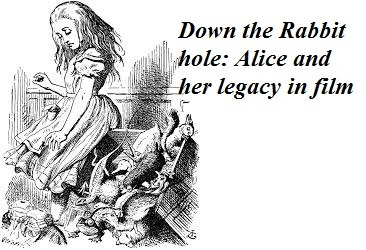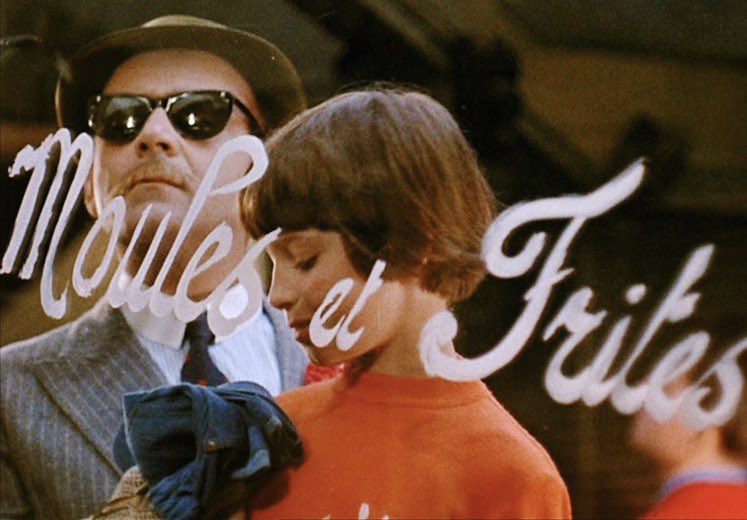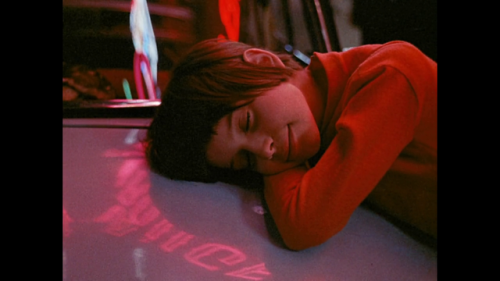

"What did you do?" "I aged"
Zazie, a foul mouthed (at least by 1960s standards) child comes to Paris whilst her mother spends a weekend with her latest lover. Under the not so watchful eye of her Uncle Gabriel, Zazie escapes into the big city and runs across a multitude of odd characters.
This is not an easy film to talk about. But let's begin with the author of the original novel.
Raymond Queneau was a French linguist and poet. He was a one time member of the surrealist group. His writing style was defined by sentences using slang French with no spaces. He was also an admirer of Lewis Carroll, as 11 years after Zazie dans le metro he wrote Du Langage Chien Chez Sylvie Et Bruno, which was a linguistic look at Carroll's most difficult work, the sylvie and bruno stories.

An anti-Alice?
All this background is necessary to talk about Zazie dans le metro. As Queneau's book uses language, Louis Malle's film version instead uses a variety of cinematic tricks which replace the linguistic word games from the book. For example there is a 5 minute chase sequence which resembles cartoons such as Looney Tunes (this is strategically placed after a slightly uncomfortable segment)
In a way both film and book function as both a reference to Carroll's Alice but also its complete polar opposite. Unlike Carroll's Alice, Queneau and malle's Zazie is bad tempered, has a love of vulgar language, is alarmingly curious about adult subjects and has little regard for politeness.

The adults she meets are characterised as bumbling fools. From the taxi driver Charles, who tries to show an uninterested Zazie Paris, to the grieving window Moaque, who helps Gabriel escape from a bizarre kidnapping. The citizens of Paris Zazie comes across whilst either in an Eiffel tower lift or in a crowd are portrayed as manic or completely mad. In a way that is comparable to Carroll, Zazie dans le metro offers up a child's eye view of adulthood where adults never shut up. In the words of Gabriel's adorably obnoxious parrot "stop yakety yaking!"
Zazie and adulthood

In complete polar contrast to Carroll's Alice, there is a distressingly adult quality to some of 10 year old Zazie's adventures. Her innocent questions about adult sexuality instead result in several extremely off colour, homophobic jokes about her Uncle Gabriel. Similarly there is a blink and miss it joke regarding Zazie and prostitution which would make any audience squirm.
Even taking into context the era (1960s) some of the jokes still feel too far even for that time period. Perhaps Malle's assertion that "I certainly hope and believe that people will laugh, but I’d be pleased if, beyond the laughter, as they leave the theater they feel shaken up and even a bit afraid" explains this strange paradox of innocence and adulthood that the film has.
There is also the segment where Zazie tricks a dirty old man into buying her blewgenes (blue genes) and mussels at a restaurant. This is played for whimsy (echoes the resturant scenes in later film Daisies, which has much older protagonists) and the audience knows Zazie will come to no harm. Despite this the scene has a potentially uncomfortable air too.
There is a dormouse's story equivalent as Zazie "entertains" her would be predator with a tale about her mother killing her father. This tale, like the dormouse's in Wonderland, is nonsensical in nature and it is the bright spot in an uneasy scene.
How do I get out there?
How she longed to get out of that dark hall, and wander about among those beds of bright flowers and those cool fountains, but she could not even get her head though the doorway.
Alice in Wonderland wants beyond anything to get into the beautiful garden, and despite making it there later, she at first grows too small, too big and then gets caught up or side tracked into other adventures.
Zazie's adventures across Paris only happen because she can't get to see the only attraction that interests her: the metro. Towards the end of the film, the metro re opens from the strike, but at that point Zazie is too tired to see it.
The protagonists reactions to not being able to do as they wish are the opposite of each other.
Alice contents herself with other adventures, with the hope of being able to get into the garden a vague focus.
Zazie in contrast calls the strike workers "bastards" and attempts to get into the metro three times, even by trying to break down a steel gate!

Things that have no names
Further on, in the wood down there, they've got no namesLanguage too, in this alternate Paris is slippery. a fake policeman claims to not remember his own name. A moment later and he claims to have no name at all. This leads to an irrational argument between him and a bootlace seller. Similarly Uncle Gabriel can recognise the sights of Paris enough to point them out to a bored Zazie, but can't remember what they're called. This is not dissimilar to Carroll's wood of no names in Looking Glass World, where Alice can remember that a tree is a tree, but not recall its name.

Life what is it but a dream?
He was part of my dream, of course -- but then I was part of his dream, too!From the top of the Eiffel tower, Uncle Gabriel descends into brief madness whilst Zazie and Charles walk down the stairs. In his bizarre rant he claims that "Paris is a dream, and Zazie is a reverie within a dream!" A further hint to the unreality of things occurs towards the end of the film a man flips through a dictionary whilst arguing and finds the definition of undreamed.

`I'm glad they've come without waiting to be asked,' she thought: `I should never have known who were the right people to invite!'In the films finale, Zazie falls asleep during an insane spaghetti fight involving all the characters she has met, echoing that Alice's dreams of both Wonderland and Looking Glass World end with an insane ensemble scene.
she told her sister, as well as she could remember them, all these strange Adventures of hers
Like Alice, Zazie has no hope of being able to explain her strange adventures to her family. Upon seeing her mother at the end of the film, she is asked what she did over the last two days. Unable to answer entirely, she reflects: "I aged."
NOTES
- Criterion collection essay on this film is a wonderful resource for understanding it.
- 366Weirdmovies's essay is useful as well.
- The original novel by Queneau is available in French, English, and a variety of other languages.

